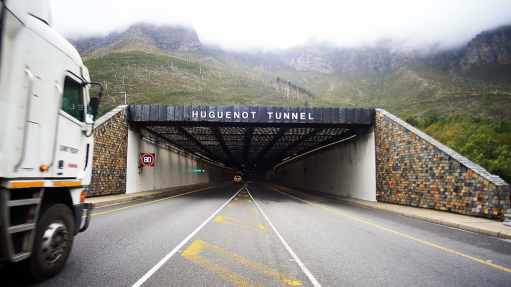
HUGUENOT TUNNEL REJUVENATION The upgrade of the Huguenot Tunnel is one of the key upcoming roads projects included in Sanral's plans for the remainder of 2024 and into 2025
With South Africa’s roads having to withstand increased traffic volumes, owing to struggling ports and rail infrastructure issues, the South African National Roads Agency Limited (Sanral) has pledged to reinvigorate the country’s roads and road infrastructure to make roads safer, more efficient and user-friendly for businesses, industry and general road users.
Sanral is completing several megaprojects, which will either continue for the remainder of 2024, or are planned for 2025, having announced a R50-billion investment for roads maintenance and upgrades in September this year, says Sanral CEO Reginald Demana.
In addition to road resurfacing comprising 1 200 km, several road projects – such as Sanral’s R5-billion upgrade to the EB Cloete interchange, and extensive improvements to the N2 and N3 highways, in KwaZulu-Natal – are under way.
The agency is completing a R23-billion project on the N2 Wild Coast Road, in the Eastern Cape, and has awarded major contracts for the Msikaba and Mtentu mega bridges, the road from the Msikaba Bridge to the Mtentu Bridge (Package 5) and the road from Msikaba Bridge to the Lingeni intersection (Package 4). Demana adds that the upgrade of the R56 from Matatiele to the KwaZulu-Natal boundary – valued at R1.2-billion – is also under way.
A R2-billion upgrade project on the N2, in Cape Town, to expand a section of the highway is going to market for construction, with the Huguenot Tunnel to be upgraded in 2025, in addition to projects on the N1 and N7 highways, in the Western Cape.
Overcoming Challenges
Despite budget and/or financial constraints, community resistance, delayed project timelines and environmental, social and governance (ESG) compliance concerns, Demana says Sanral has an array of solutions to address most challenges.
This includes forming public–private partnerships to mitigate financial limitations by obtaining access to additional funds, technology and expertise from private-sector stakeholders, as well as conducting financial audits, cost-benefit analyses and reducing wasteful expenditure by stakeholders, through establishing strict financial controls.
To overcome delayed project timelines, Sanral adopts realistic timelines and ensures that optimised project planning takes place so that all stakeholders and contractors can adhere to deadlines.
The agency also engages with community members to inform them of projects that are under way in their respective communities and what the opportunities are for them to participate. These include local labour, subcontracting and supplier opportunities.
To ensure enhanced ESG compliance during the processes involved in road project completion, Sanral liaises and collaborates with various environmental bodies to establish viable mitigation strategies to ensure environmentally-sound practices and human safety. The agency also conducts thorough environmental-impact assessments to create infrastructure designs that can be executed with minimal impact on the environment.
Sanral empowers black-owned contractors and construction companies to participate in national construction projects by allowing black contractors to access about 30% of the contract value of all projects. This is done through a tender process.
“Sanral recently embarked on a series of consultation sessions with black contractors around the country to present the Contractor Development Programme and Black Industrialists Scheme, which are further efforts to expedite transformation of the road construction sector,” says Demana.
Beyond the significant investment into conventional construction and infrastructure upgrades, Sanral will conduct Routine Road Maintenance (RRM) across the country’s road network of about 25 000 km, every day. RRM includes cleaning and maintaining road signs, cutting grass and fixing potholes, as well as waste picking and disposal.
“The routine road maintenance projects deliver significant opportunities for black contractors to participate in the projects over a five-year period. At least 50% of the work must be sublet to black contractors, including businesses owned by women, youth, persons with disabilities and military veterans,” he concludes. ![]()